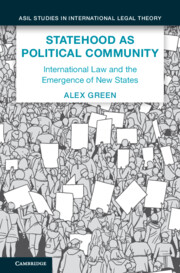Book contents
- Statehood as Political Community
- ASIL Studies in International Legal Theory
- Statehood as Political Community
- Copyright page
- Dedication
- Epigraph
- Contents
- Acknowledgements
- List of International Instruments
- List of International Judgements and Awards
- List of Domestic Judgements and Legislation
- Introduction
- Part I Political Community
- 1 Political Ethics and Community Membership
- 2 Political Action and Valuable Institutions
- 3 The Antecedents of Statehood
- 4 Five Procedural Principles
- Part II Stability, Legitimacy, and Democracy
- Bibliography
- Index
2 - Political Action and Valuable Institutions
from Part I - Political Community
Published online by Cambridge University Press: 15 February 2024
- Statehood as Political Community
- ASIL Studies in International Legal Theory
- Statehood as Political Community
- Copyright page
- Dedication
- Epigraph
- Contents
- Acknowledgements
- List of International Instruments
- List of International Judgements and Awards
- List of Domestic Judgements and Legislation
- Introduction
- Part I Political Community
- 1 Political Ethics and Community Membership
- 2 Political Action and Valuable Institutions
- 3 The Antecedents of Statehood
- 4 Five Procedural Principles
- Part II Stability, Legitimacy, and Democracy
- Bibliography
- Index
Summary
This chapter establishes the broader contours of politics, conceived as a discrete domain of ethical behaviour. It begins by detailing some paradigmatic instances of political action, organised into two categories: 'direct' and 'indirect'. Next, it examines the relationship between political action and violence, arguing that although individual violent acts might instantiate ethically valuable politics to some degree, truly endemic violence is inimical to politics. Having established this, it turns to the relationship between politics, equality, and inclusion, arguing that politics takes place primarily within geographically demarcated communities and that, as a result, we are justified in prioritising the participation of our compatriots. Finally, this chapter examines the role played by governance institutions within contemporary states, arguing that they fulfil an essential facilitating function. This grants them 'quasi-independent' value as political 'artefacts', 'focuses', and 'forums'. Taken together, these various arguments bridge the conceptual and normative gap between the analysis of the previous chapter and the account of state creation advanced later in the book.
Keywords
- Type
- Chapter
- Information
- Statehood as Political CommunityInternational Law and the Emergence of New States, pp. 48 - 69Publisher: Cambridge University PressPrint publication year: 2024

